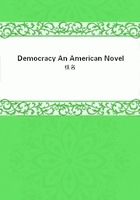
第33章
Ratcliffe sat ten minutes with him, and obtained information in regard to pains which the President had suffered during the previous night, in consequence, as he believed, of an over-indulgence in fresh lobster, a luxury in which he had found a diversion from the cares of state. So soon as this matter was explained and condoled upon, Ratcliffe rose and took leave.
Every device known to politicians was now in full play against the Hoosier Quarryman. State delegations with contradictory requests were poured in upon him, among which that of Massachusetts presented as its only prayer the appointment of Mr. Gore to the Spanish mission. Difficulties were invented to embarrass and worry him. False leads were suggested, and false information carefully mingled with true. A wild dance was kept up under his eyes from daylight to midnight, until his brain reeled with the effort to follow it. Means were also found to convert one of his personal, confidential friends, who had come with him from Indiana and who had more brains or less principle than the others; from him every word of the President was brought directly to Ratcliffe's ear.
Early on Friday morning, Mr. Thomas Lord, a rival of the late Samuel Baker, and heir to his triumphs, appeared in Ratcliffe's rooms while the Senator was consuming his lonely egg and chop.
Mr. Lord had been chosen to take general charge of the presidential party and to direct all matters connected with Ratcliffe's interests. Some people might consider this the work of a spy; he looked on it as a public duty. He reported that "Old Granny" had at last shown signs of weakness. Late the previous evening when, according to his custom, he was smoking his pipe in company with his kitchen-cabinet of followers, he had again fallen upon the subject of Ratcliffe, and with a volley of oaths had sworn that he would show him his place yet, and that he meant to offer him a seat in the Cabinet that would make him "sicker than a stuck hog." From this remark and some explanatory hints that followed, it seemed that the Quarryman had abandoned his scheme of putting Ratcliffe to immediate political death, and had now undertaken to invite him into a Cabinet which was to be specially constructed to thwart and humiliate him.
The President, it appeared, warmly applauded the remark of one counsellor, that Ratcliffe was safer in the Cabinet than in the Senate, and that it would be easy to kick him out when the time came.
Ratcliffe smiled grimly as Mr. Lord, with much clever mimicry, described the President's peculiarities of language and manner, but he said nothing and waited for the event. The same evening came a note from the President's private secretary requesting his attendance, if possible, to-morrow, Saturday morning, at ten o'clock. The note was curt and cool. Ratcliffe merely sent back word that he would come, and felt a little regret that the President should not know enough etiquette to understand that this verbal answer was intended as a hint to improve his manners. He did come accordingly, and found the President looking blacker than before. This time there was no avoiding of tender subjects. The President meant to show Ratcliffe by the decision of his course, that he was master of the situation. He broke at once into the middle of the matter: "I sent for you," said he, "to consult with you about my Cabinet. Here is a list of the gentlemen I intend to invite into it. You will see that I have got you down for the Treasury. Will you look at the list and say what you think of it?"
Ratcliffe took the paper, but laid it at once on the table without looking at it. "I can have no objection," said he, "to any Cabinet you may appoint, provided I am not included in it. My wish is to remain where I am. There I can serve your administration better than in the Cabinet."
"Then you refuse?" growled the President.
"By no means. I only decline to offer any advice or even to hear the names of my proposed colleagues until it is decided that my services are necessary. If they are, I shall accept without caring with whom I serve."
The President glared at him with an uneasy look. What was to be done next?
He wanted time to think, but Ratcliffe was there and must be disposed of. He involuntarily became more civil: "Mr. Ratcliffe, your refusal would knock everything on the head. I thought that matter was all fixed. What more can I do?"
But Ratcliffe had no mind to let the President out of his clutches so easily, and a long conversation followed, during which he forced his antagonist into the position of urging him to take the Treasury in order to prevent some undefined but portentous mischief in the Senate. All that could be agreed upon was that Ratcliffe should give a positive answer within two days, and on that agreement he took his leave.
As he passed through the corridor, a number of gentlemen were waiting for interviews with the President, and among them was the whole Pennsylvania delegation, "ready for biz," as Mr. Tom Lord remarked, with a wink.
Ratcliffe drew Krebs aside and they exchanged a few words as he passed out.
Ten minutes afterwards the delegation was admitted, and some of its members were a little surprised to hear their spokesman, Senator Krebs, press with extreme earnestness and in their names, the appointment of Josiah B. Carson to a place in the Cabinet, when they had been given to understand that they came to recommend Jared Caldwell as postmaster of Philadelphia. But Pennsylvania is a great and virtuous State, whose representatives have entire confidence in their chief. Not one of them so much as winked.